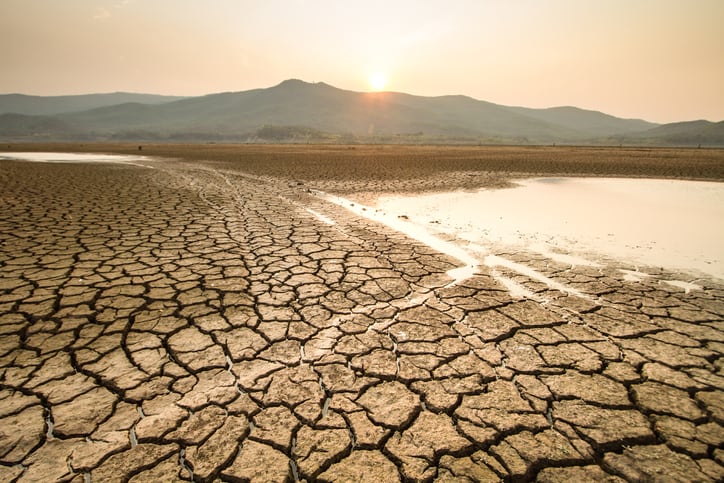The Global Consumer Staples sector faces a $200bn impact from water scarcity and is the most exposed of all sectors to water risk, its team of analysts wrote in a note to investors.
In a report the team analysed the risks and opportunities facing the Global Staples sector from impending water shortages, increased cost and regulation. Their forecasts suggest that global freshwater requirements for food production are set to increase by 40% by 2030 as a result of a growing global population. Increasing global temperatures have exacerbated the water risk, yet a reliable water supply is required to reduce the global carbon footprint. They therefore conclude water scarcity is the most important environmental concern in the consumer staples sector.
“Our analysis suggests water should be considered the largest driver of environmental concern for the staples sector,” wrote the team of analysts, adding that water is likely to have “a greater financial impact on the sector than carbon reduction strategies”.
The report said that food-related companies themselves are increasingly aware of the risk posed by water scarcity to their operations -- Unilever, for example, faces a 40-50% EBITA impact even at the lower end of Barclay’s scenarios -- and the Barclay’s analysts noted that water-related dialogue in company discussions has grown over 40% in 2020.
Investors, however, are “instead focussing mainly on the potential impact of rising carbon costs”, they noted, a fact which could threaten innovation in the water saving areas.
The team further estimated that the 'true cost' of water is 3-5x greater than the price companies currently pay, once the indirect and direct costs of water shortages and related risks are incorporated. Cost of inaction therefore outweighs the cost of action, the analysts concluded.
Steps to significantly reduce company dependence on water – such as the adoption of sustainable agricultural practices including precision irrigation, soil-less cultivation and using sensors and satellite data for effective management of water consumption – therefore offers future-proofing opportunities for those in the consumer staples sector.
“For companies, a ‘true cost’ of water will help them be resilient to the increase in water prices due to the removal of subsidies, water rationing and increasing water scarcity; justify economic viability of water efficiency and wastewater treatment (and reuse) projects to investors; help make better investment decisions for greenfield projects or acquisitions in regions where they can be at risk of stranded assets in future due to water scarcity,” the Barclay’s analysts wrote, adding that droughts, water shortages and extreme weather events which have become more frequent in recent years will be key long-term themes over the next decade. “These will have a direct operational impact on companies. Through a combination of changes to subsidies and taxation, the price of water will likely increase globally. We expect stakeholders to reward companies who take a proactive approach to water conservation.”
The conclusions of the Barclay’s report echo earlier research showing the cost of water risks to food business outweigh the cost of addressing them.
According to a report by CDP, a non-profit that runs an environmental disclosure platform, food sector companies reported the potential financial impact of water risks as US$19.6 billion, and the cost of responding to the risks at just US$1.1 billion. This analysis calculated that 14% of food sector companies have targets for reducing water pollution (the cross-sector average is 12%) and that 414 food sector companies disclosed their water information through CDP in 2020, up from 390 in 2019, making it one of the sectors with the highest disclosure, after manufacturing and materials.
Some food sector companies are taking ambitious action, CDP observed. For example, PepsiCo is using reverse osmosis to improve the quality of wastewater, and Mars is investing in an innovative ‘wet-dry’ irrigation system for rice that saves water, carbon and money. Mars’ introduction of wet-dry irrigation for rice cultivation is expected to reduce water consumption by 30%, increase farmers’ incomes by 30% and reduce carbon emissions.
David Grant, Director: Global Water Stewardship, PepsiCo, said: “PepsiCo is committed to ensuring that wherever we operate, watersheds are healthier because we’re there. It’s a business imperative – we need a sustainable supply of fresh water to make our consumers' favourite foods and beverages – It’s also the right thing to do. That’s why PepsiCo is making significant investments in waste-water treatment. This not only reduces potential pollution but also offers PepsiCo an opportunity to recover treated water and close the loop in our own manufacturing processes – supporting our overall drive towards a circular economy.”
Kevin Rabinovitch, Global VP Sustainability, Mars, said: “Protecting water security is vital to the long-term sustainability of our agricultural supply chains, such as mint and rice, and the livelihoods of farming communities which rely on it. At Mars, we’re taking action such as following best practice from the Sustainable Rice Platform, where we’re making progress with techniques such as alternative wetting and drying irrigation in rice farming. These techniques are driving win-wins by increasing farmer productivity and improving livelihoods, whilst also reducing our environmental and climate footprint, including our water usage and carbon emissions.”



